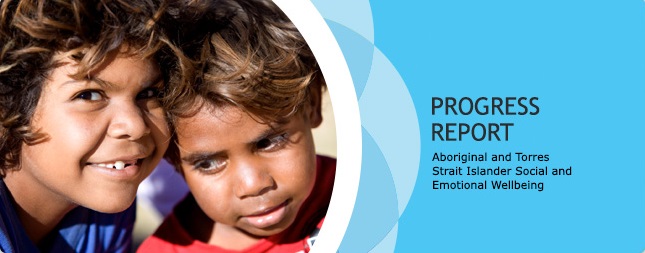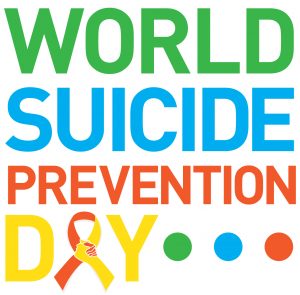council-meeting-june-2016-1024x683.jpg
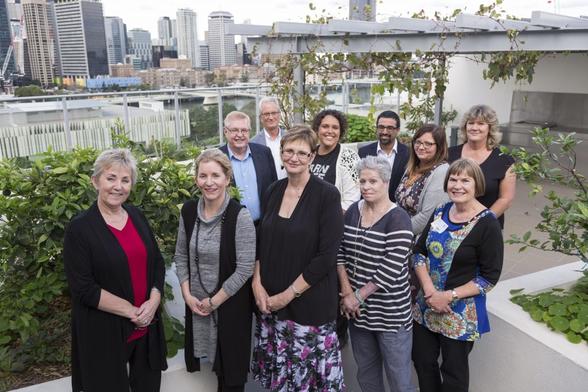
Mental Health Commissioner Lesley van Schoubroeck with the Queensland Mental Health and Drug Advisory Council. Left to right: Dr Lesley van Schoubroeck, Jane Williams, Kingsley Bedwell, Jeremy Audas, Dr Peggy Brown, Samantha Wild, Martina McGrath, Hamza Vayani, Emma Kill, Jan Kealton, Kerrie Keepa. Absent: Dr Mark Wenitong, Janice Crosbie, Mitchell Giles, Etienne Roux, Professor David Kavanagh
Commissioner's Update
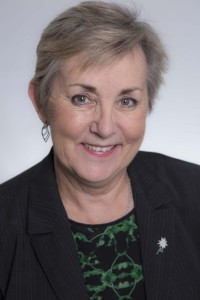
This month we celebrate the Commission’s third year of establishment.
To mark the occasion I have prepared a short video message reflecting on our achievements and outlining our direction into 2017 and beyond. Watch the video
Interim appointment
Our third year of establishment also brings the end of my initial three-year appointment as Mental Health Commissioner.
Minister for Health Cameron Dick has approved my appointment as Acting Commissioner from 1 July 2016 to 28 February 2017. An ‘acting’ appointment has been made to provide time for the independent review of the Commission’s effectiveness to be finalised and the subsequent review of the effectiveness of the QMHC Act 2013 to be completed.
Achievement through partnerships
Since the Commission began, mental health and wellbeing has come further into the light in Queensland. I am fortunate to have been a part of that. Our achievements could not have occurred without the many people and organisations working with us. Together we have achieved much, but there is still more we can do.
2017 and beyond
During the next three years, I’d like to see the Commission further strengthen the voice of lived experience. Several projects nearing completion will inform our actions. There are some great organisations supporting advocacy in Queensland, including many great local examples, but we can make more of our collective effort with a more potent voice at the system level.
You can also expect more debate around rights protection, particularly involuntary treatment.
We will be working to extend initiatives in parts of the State that may not have been best-served in the past, and balancing our focus on mental health, suicide prevention and alcohol and other drugs.
We will be looking for opportunities to strengthen connections within communities, with grassroots community-owned programs, as well as projects for more vulnerable groups.
We will continue to highlight areas needing more integrated and responsive services.
The decisions and actions we take today will shape and advance Queensland’s mental health and wellbeing long into the future.
Advisory Council
Message from the Chair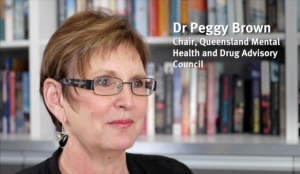
Last month we welcomed the appointment of a new Chair and 10 new Members to the Queensland Mental Health and Drug Advisory Council.
Council Chair, Dr Peggy Brown, is a strong advocate for people with mental health and alcohol and other drug issues with around 30 years’ experience in the mental health sector.
Hear from Peggy in her video message
Council meeting
The Advisory Council, complete with new Chair and Members, met for the first time last month. A number of issues were raised at the meeting, including:
- Transitioning to the National Disability Insurance Scheme
- The independent review of the effectiveness of the Commission
- Least restrictive practices, including locked wards
- Establishment of the Multicultural Queensland Advisory Council
- The importance of lived experience from the different perspectives of mental illness, suicide, and problematic alcohol and other drug use.
Read the meeting communique
Firearm safety
Following a query from a Council Member, the Commission has confirmed with the Queensland Police Service that their officers should exercise discretion when carrying firearms in hospitals. However, if they are to remove them prior to entry, officers are required to store their firearms in a Police Service-approved safe which needs to be provided by the Health Service. They must not carry firearms in authorised mental health high or medium security units.
Aboriginal and Torres Strait Islander wellbeing
Progress to report
To mark NAIDOC Week 2016, the Commission released a progress report on the development of a Queensland Aboriginal and Torres Strait Islander Social and Emotional Wellbeing Action Plan.
The report summarises feedback from more than 200 Aboriginal and Torres Strait Islander Queenslanders and other stakeholders during consultation about social and emotional wellbeing and priority actions for the Queensland Government. Suggestions by community members and stakeholders include the importance of acknowledging and celebrating cultures to promote the strength and resilience of Queensland’s diverse Aboriginal and Torres Strait Islander communities.
We thank the Traditional Owners and Elders who welcomed us to their Country to undertake the community forums, and the Aboriginal and Torres Strait Islander community members and organisations who generously shared their experiences and views.
Read the Progress Report and the media release
Alcohol and other drugs
On the agenda
The Commission was pleased to host a meeting for Minister for Health and Minister for Ambulance Services Cameron Dick MP with representatives from Queensland’s alcohol and other drugs sector last month. It was an opportunity to engage in a wide-ranging discussion on what matters to the alcohol and other drugs sector.
The meeting was one of a series with the Minister, each focusing on:
- Alcohol and other drugs
- Suicide prevention
- Mental health
We thank the sector leaders who came along and contributed to discussion. Thanks also to the Minister for the generous time he spent with us.
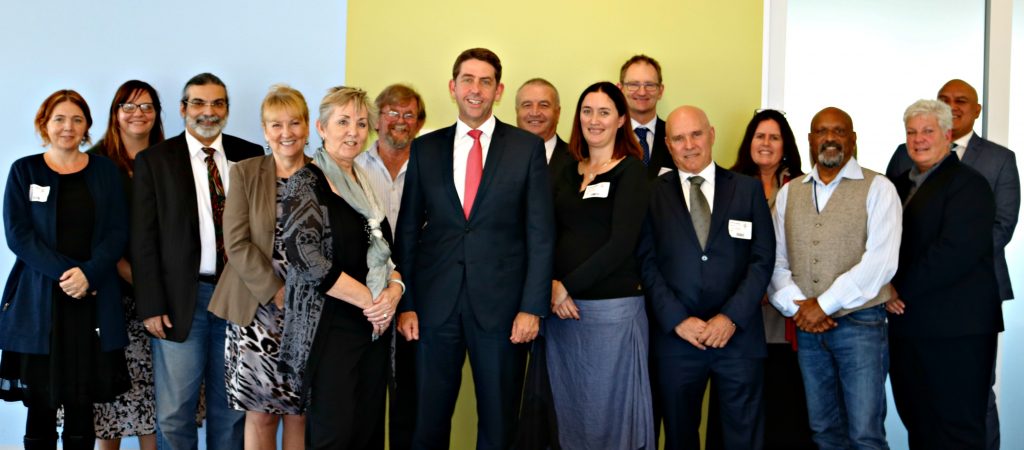
Tackling alcohol and other drugs on the frontline
Metro South Addiction and Mental Health Services have established a Drug and Alcohol Brief Intervention Team (DABIT) at Logan Hospital’s Emergency Department to minimise harm related to drugs and alcohol-fuelled violence.
This new frontline service delivers one of the Queensland Government’s (Queensland Health) commitments under the Queensland Alcohol and Other Drugs Action Plan 2015-17 (Action 4).
More about this initiative on the Metro South Health website
Lived experience
Listening to consumers, families, carers
The Commission often hears from consumers, families and carers about issues of particular concern. Most recently we heard from a man with lived experience of mental illness regarding the locked wards policy in Queensland’s hospitals and its potential impact on patient rights. He expressed concern that the policy is a barrier preventing some, like him, from accessing treatment when acutely unwell.
The Commission’s position on this is not black and white. In some instances it is important to keep wards locked for the safety of patients, but there are also negative outcomes when there is a blanket rule that all wards must be locked. There should be more discretion at the local level. Our understanding is that voluntary patients are able to come and go with relative ease.
In 2014, the Commission released the Options for Reform report Moving towards a more recovery-oriented, least restrictive approach in acute mental health wards including locked wards. The Commission, with the Advisory Council, will take another look at perspectives about the current policy and our position in the coming months.
Read the recently released statement from the United Nations regarding mental health and human rights.
Project Gauge
Last month saw the launch of Project Gauge, a toolkit to support engagement and participation of alcohol and other drugs service users.
The toolkit was developed to introduce services to moving beyond individual engagement and to create partnerships with their clients and improve the safety and quality of care. Although targeted toward Queensland public health alcohol and other drug services, the toolkit can be accessed and used by anyone.
The Commission is proud to have been involved in this new resource. Go to Project Gauge
Suicide prevention
Budget initiatives
The Queensland Government recently announced a $9.6 million Suicide Prevention in Health Services Initiative as part of the $15.274 billion state health budget. The initiative aims to help Hospital and Health Services build their capacity to prevent suicide through:
- The establishment and operation over three years of a Queensland Suicide Prevention Health Taskforce as a partnership between the Department of Health, Hospital and Health Services and Primary Health Networks.
- Analysis of events relating to deaths by suspected suicide of people that had recent contact with a health service to inform future actions and improvements in responses.
- Continue implementing training for hospital emergency department staff and other frontline acute mental health care staff in recognising, responding to and providing care to people presenting to Hospital and Health Services with suicide risk.
Read the media release
This new funding further supports the Queensland Suicide Prevention Action Plan 2015-17 and is another step towards achieving a 50 per cent reduction in suicide in Queensland within a decade.
Download the Action Plan
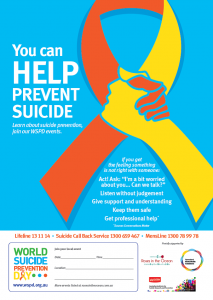 World Suicide Prevention Day
World Suicide Prevention Day
Holding a World Suicide Prevention Day event can help prevent suicide.
How? By changing the conversation to focus on hope and optimism, by speaking openly and safely about suicide and combatting the stigma that often prevents people from seeking help, and by linking people with local support services and sources of help.
A downloadable poster is now available to help promote your WSPD event in your workplace, school, sporting club, or community.
A downloadable event host guide and more information about holding an event is on our website
System reform
Parliamentary inquiries
Health promotion
The Parliamentary Inquiry into the establishment of a Queensland Health Promotion Commission has recommended one be established, however did not determine its model.
Our submission to the Inquiry reflected on some of the learnings from establishing the Mental Health Commission and we appreciate the observation of the Chief Health Officer who noted that ‘the Mental Health Commission has been very strategic in its direction and has engaged with the community.’ If a Health Promotion Commission is established, it will be important to understand how it will complement our work.
Read the Inquiry Report
Human rights
The Human Rights Inquiry did not reach an agreed position on whether Queensland should have a Human Rights Act.
Government members of the Parliamentary Committee concluded that it is appropriate and desirable to have a Human Rights Act in Queensland, however non-government members disagreed. They recognised that many issues carry a human rights dimension, but felt that direct legislation and priority by executive government were the best ways to address those issues.
Certainly many of the issues highlighted in the Commission’s submission to the Inquiry could be addressed without a Human Rights Act.
Download the Inquiry Report
Health service complaints
The Commission will soon be making a submission to the Inquiry into oversight of the Health Ombudsman and the health service complaints management system.
Our submission will focus on ways the health service complaints management system might be improved from the perspective of people with mental health and alcohol and other drug issues. We will draw on feedback already received regarding how frustrating the complaints system can be.
More information about the Inquiry is available through Queensland Parliament
Improving police interactions
Last year the Commission provided funding to the Queensland Forensic Mental Health Service to evaluate and examine police interactions with people experiencing mental illness or a mental health crisis. This has now resulted in the Police Communications Centre Mental Health Liaison Service Evaluation Report. It is the first of a set of papers that will be provided and will guide future service delivery. Stay tuned for more updates.
Creating job opportunities
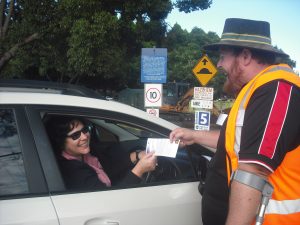 Eight positions for people with a lived experience of mental illness have been created with several local social enterprises through the Toowoomba Social Procurement Project. And that is just the start.
Eight positions for people with a lived experience of mental illness have been created with several local social enterprises through the Toowoomba Social Procurement Project. And that is just the start.
With the support of the Commission, Toowoomba Clubhouse and the Darling Downs Primary Health Network launched the Toowoomba Social Procurement Project earlier this year. The project aims to source job opportunities for people with a lived experience of mental illness, who wish to secure employment. The project will also educate government departments and corporates on how social enterprise can help their business.
Businesses to support this initiative include St Vincent’s Health Australia, the Department of Transport and Main Roads, Nexus and the Department of Housing and Public Works.
Contact kirsten@toowoombaclubhouse.org.au to find out more.
Implementing mental health legislation
Stay up-to-date with the implementation of the Queensland Mental Health Act 2016. The Queensland Health Implementation Team publishes regular newsletters on their website.
The latest newsletter provides updates on developing the Independent Patient Rights Adviser roles, new fact sheets, information products for consumers, and development of an e-Learning package for doctors, psychiatrists and mental health practitioners.
We note that South Australia has recently made amendments to their Mental Health Act including strengthening the independent Community Visitors function.
Community
2016 grants program opening soon
The Commission will soon be opening the Stronger Community Mental Health and Wellbeing Grants Program. This year, grants up to $50,000 are available to support innovative locally-led, collaborative initiatives that:
- support social inclusion by fostering opportunities and removing barriers for individuals and groups to develop and maintain supportive relationships and a sense of community connection and connections to others
- support community participation by providing opportunities and removing barriers to undertaking activities which are meaningful, engaging and which enhance feelings of confidence and self-worth
- improve the physical health of people living with mental illness through integrated, evidence-based community programs.
More information about the Grants Program and how to apply will be available on our website from the first week of August 2016.
We’re refreshing
After three years dedicated service our website is in need of some serious renewal.
We need your help to ensure the website reflects the needs of our stakeholders.
Take a few minutes to help us refresh… do the survey now
Queensland Mental Health Week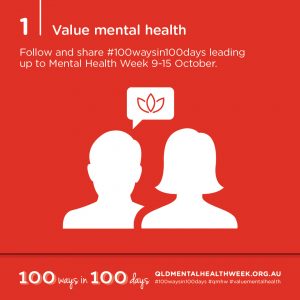
Queensland Mental Health Week (9-15 October) is less than 100 days away.
Count down the days to QMHW with tips and advice about how you can value mental health. Check out the #100waysin100days campaign on Facebook, Twitter and Instagram.
Get involved
Get involved and help build towards the biggest and best Queensland Mental Health Week yet:
- Check out the new look website
- Show your support by leaving a message on the supporters wall
- Start planning your event or activity to raise awareness in your local community. Download the participant kit for inspiration and ideas and register your event
Wellness Riverwalk 2016
The Mental Health Commissioner recently had the pleasure of speaking at the Wellness Riverwalk 2016 launch. The Mental Health Week event promises to be a great family day out to promote mental health awareness and reduce the stigma associated with mental illness.
Information about sponsoring this event is on the website
How bad can this be?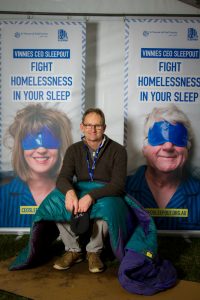
A brief encounter with the realities of homelessness
Advisory Council member and Lives Lived Well CEO Mitchell Giles took part in the Vinnies CEO Sleepout last month. The event is an opportunity to walk in the shoes of the 105,000 Australians experiencing homelessness.
This is Mitchell’s account of what happened:
“I set off to the CEO Sleepout on foot. I walked from Spring Hill to the other side of the Story Bridge – it was dark... I arrived at my ‘campsite’ to a rather surreal experience. I was given a name tag and bag. It was just like a conference, how bad can this be?...”
Read Mitchell's full account
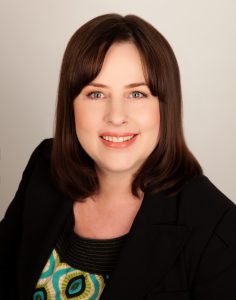 Thank you Melody
Thank you Melody
The Commission wishes Melody Edwardson well in her future endeavours. Formerly Director at the Queensland Alliance for Mental Health Inc., Melody was instrumental to the Commission in linking with the community sector in our early days.
Our sincere thanks Melody, and all the best.
Sector news
International mental health leaders
The 2017 International Initiative for Mental Health Leadership (IIMHL) Exchange is coming to Australia.
The Exchange will be in Sydney; however there will be several matches in Queensland. The Commission is supporting two of these matches for lived experience and Indigenous leadership. We’re also looking forward to hosting an event to welcome delegates to Queensland.
Find out more or register on the IIMHL website
SPARK exchange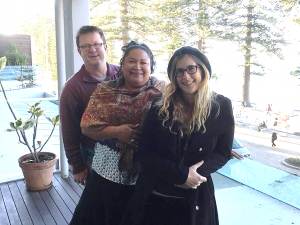
The Commission recently supported three Queensland representatives to participate in the IIMHL Supporting the Promotion of Activated Research and Knowledge (SPARK) exchange program in Sydney.
Dr Louise Byrne, Nathan Dart and Kimina Andersen reported that they found the training to be an enjoyable, worthwhile experience and that they came away with some very useful, practical tools and tips.
Grants
- Google Impact Challenge – The Google Impact Challenge supports non-profit innovators using technology to tackle the world's biggest social challenges. Google will award $4.5 million across 10 organisations to help bring their ideas to life. Find out more
- ANZ Staff Foundation – Grants available for community projects that relate to education and employment; urban and rural economic and social divides; financial capability; and urban sustainability. Apply
- Sunsuper Dreams for a Better World (Sport and Education) – This round is for energetic thinkers and dreamers who want to make the world a better place for sporting clubs, recreational causes and anyone wanting to learn new skills or teach others. Read more
- Bennelong Foundation – The Foundation aims to enhance community wellbeing and provide opportunities for positive and lasting change in our community. Current priority focus areas are education, training and employment; community health; and migrant and Indigenous community welfare. Find out more
- Future 2 Foundation – Future2 seeks to support programs that address the needs of disadvantaged young Australians. Find out more
- Honda Foundation – Grants up to $20,000 available to support organisations who help the disadvantaged, disabled, or those suffering from long-term and life-threatening illnesses. Aside from providing funding, The Honda Foundation also conducts a 12-month Loan Vehicle Program. Apply here
- Mackay Regional Council grant program – Up to $5,000 assistance available to local community groups or organisations who make positive contributions to the quality of life in the Local Government area. Find out more
- HESTA Community Sector Awards – The awards recognise outstanding service provision, advocacy and leadership in improving the lives of people who rely on access to the services of this sector. It is an opportunity to recognise the work individuals and organisations provide to the broader community, supporting those who need it most. Winners will share in a $30,000 prize pool. Nominate
- Gambling Community Benefit Fund – Next round closes 31 August. Find out more
Resources
- Insights of people with psychosis – Five ‘Insights’ developed by Psychosis Australia focusing on mental health, physical health, services and support, employment and social isolation. Download the publications
- Best Practice in Early Psychosis Intervention for Australian Indigenous Communities – Literature Review, Indigenous Mental Health Worker Consultation and Case Study. Download the report
- MJA article ‘Coping with patient suicide’ – This article discusses the impact of patient suicide on treating doctors. Read the article
- Alcohol and other drug treatment services in Australia 2014-15 – The Australian Institute of Health and Welfare has released a new report and web updates. Read the media release and download the report
- Medication use by Australia's prisoners 2015 – New report from the Australian Institute of Health and Welfare reports that “prisoners were more likely than those in the general community to be taking medication for health problems, including mental health issues, addictions and chronic conditions.” Read the media release and download the report
- Queensland: An age-friendly community – A new Action Plan for Queensland launched last month by the Hon. Coralee O’Rourke MP, Minister for Disability Services, Minister for Seniors and Minister Assisting the Premier on North Queensland. Download the Action Plan
- Patient and Consumer Centred Care – Information and resources provided by the Australian Commission on Safety and Quality in Health Care. Go to the website
Events
- 14 July 2016 Mindful Networking ‘Lighting the Dark’ – The next Queensland Alliance for Mental Health Inc. networking event will feature a presentation from Mr Dion Tatow, Senior Policy Officer (Mental Health) with the Queensland Aboriginal and Islander Health Council. More information or register here
- 18-19 July 2016 CAMS latest theory, clinical and research findings workshop with Prof David Jobes –This 1.5 day workshop for mental health workers, clinicians and therapists aims to facilitate the adherent use of CAMS (Collaborative Assessment and Management of Suicidality) via supportive training. Register here
- 23-24 July 2016 Family Connections Leaders Training – Sydney. An evidence-based program for family and friends of people with borderline personality disorder that provides peer support, psychoeducation and skills anchored in dialectical behavior therapy (DBT). Flight and accommodation packages are available for interstate attendees. Register your interest
- 24-27 July 2016 National Suicide Prevention Conference – Canberra. More information
- 6-7 August 2016 Integrative Mental Health Seminar – Gold Coast. Topics include Partners in Recovery and NDIS, Integrative Health, Dual Diagnosis, Addictions and Mental Health and more. More information
- 10-12 August 2016 17th International Mental Health Conference – Program includes over 75 presentations, optional workshops, and two networking functions. Find out more
- 23-26 August 2016 World First Nations Traditional Knowledge Conference – South Brisbane. The conference will be centred on six key themes: Lore, Knowledge, Culture, Medicine, Spirit and Law. More information
- 25-26 August 2016 Interpersonal Psychotherapy for adolescents and adults: An attachment-based intervention for depression and related disorders – Brisbane. An intensive skill development workshop for Interpersonal Psychotherapy, an engaging and evidence-based therapy. Register
- 24-26 October 2016 12th Biennial Asia Pacific International Mental Health Conference – The conference theme is Recovered Futures: People, Practice, Partnership, Policy. Submit an abstract or register now. Find out more
Surveys
- Annual Youth Survey – Mission Australia is calling on Australia’s youth to express their concerns and hopes for the future by taking part in the largest annual nationwide poll of young Australians. Open to all Australian youth aged 15-19 years. Closes 31 July 2016. Take the survey
Other
- Bayside Initiatives Group Inc – A peer support based mental health service with regular events and activities for those in the Brisbane Bayside area. Visit their Facebook page
- 2016 Human Rights Awards – Nominations open for individuals or organisations doing inspiring work promoting and protecting human rights and freedoms. Nominate now
